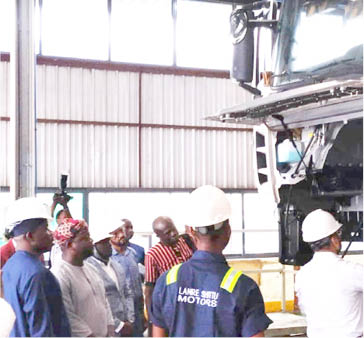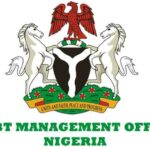The Director-General of the National Automotive Design and Development Council (NADDC), Oluwemimo Joseph Osanipin, yesterday expressed the commitment of the federal government to transmit from Semi-Knocked Down (SKD) to Complete Knocked Down (CKD).
Osanipin assured that the government would invest in made-in-Nigeria vehicles to reduce dependence on vehicle importation.
The NADDC boss spoke during an inspection to Lanre Shittu Motors Assembly Plant in Lagos, emphasising that President Bola Ahmed Tinubu had directed ministries, departments and agencies (MDAs) to patronise vehicles manufactured or assembled in Nigeria.
Daily Trust reports that under the National Automotive Industry Development Plan (NAIDP), Nigeria ought to have transmitted into CKD from SKD.
Recently at a forum in Lagos, Osanipin revealed that instead of graduating into CKD, Nigeria had been doing reversed SKD with little or no local content added.
- NIGERIA DAILY: Can The Supreme Court Ruling Guarantee Autonomy For LGAs?
- FG: Nigeria-EU partnership on tech innovation will unlock Nigeria’s economy
He, however, called on Nigerians to embrace locally assembled vehicles to increase its spread and federal government’s vision of improved local content in the automotive sector.
He said: “The first support is patronage, and that is what we have seen. And it is not only the government but all Nigerians. The first support we are asking is from all Nigerians. Let’s replicate what we have done in the truck business.
“Most of the new trucks you see on the road today are assembled in Nigeria; and Nigerians have embraced that. Can we now start taking it further by doing so with buses?
“Yes, it will be easier with buses. People who are investing in buses are not doing so for luxury; they are investing in it to make more money.
“They will be cautious of downtime. If it can go down with a truck, let Nigerians embrace buses. And the government is going to patronise made-in-Nigeria vehicles. The president had said that for any ministry or agency to make any submission for vehicle acquisition, it had to be those manufactured or assembled here in Nigeria; in fact, it has to be compressed natural gas (CNG). This is how governments support; and that is what the government is doing currently.
“Part of what we are doing is what we are here for: to lend our support for those in the automobile sector.”
Osanipin said he was impressed with what he saw at the Lanre Shittu Motors.
“We came here to look at the process because we have been talking about building capacity and doing full SKD. We have the plan to transmit from SKD to CKD. And you could see that we have seen the way the pickup came; the frame and everything are being done. All the kits are put together and assembled right here in Nigeria.
“In this factory, you have seen how the heavy duty vehicles are being assembled. We are here to look at what they are doing and look at how we can now take it further. We want to see some of these things being done right here in the factory. I was just told that the other facility under construction is for wielding while the painting will be somewhere in Ogun State. It is being built now,” he said.
The managing director of Lanre Shittu Motors, Mr Taiwo Shittu, said the company had delivered some CNG-powered mass transit buses for airport shuttle.
He disclosed that the company could do six units daily, adding that the firm saw the huge business in the CNG-powered vehicles shortly after the removal of fuel subsidy by the federal government and went straight into it.
He said, “From our knowledge of automobiles – this is our 43 years in the industry – we knew that once the fuel subsidy was removed, the next option would be the CNG. So we went straight into CNG vehicles.
“As we speak, we are converting our vehicles to run on CNG. We have conversion kits on the ground. We have mass transit buses already at the airports for shuttle, assembled here in Nigeria.
“Another set of CNG mass transit buses have arrived at the seaport and are being cleared. This will be for commercial operation. And it will reduce operation cost by 25 per cent.”
Shittu said the company placed premium on after-sale support, with over N2 billion worth of spare parts in its store.
“For any vehicle or auto brand to survive in Nigeria, after-sale support is very important. We have been the sole distributor in Nigeria for many brands, including MAN and JAC. Having passed through this stage, we understand that no vehicle brand can make any headway in the country without adequate parts.
“A lot of made-in-Nigeria vehicles failed in the past because the handlers did not realise that without sufficient spare parts, they would not survive,” he added.

 Join Daily Trust WhatsApp Community For Quick Access To News and Happenings Around You.
Join Daily Trust WhatsApp Community For Quick Access To News and Happenings Around You.


